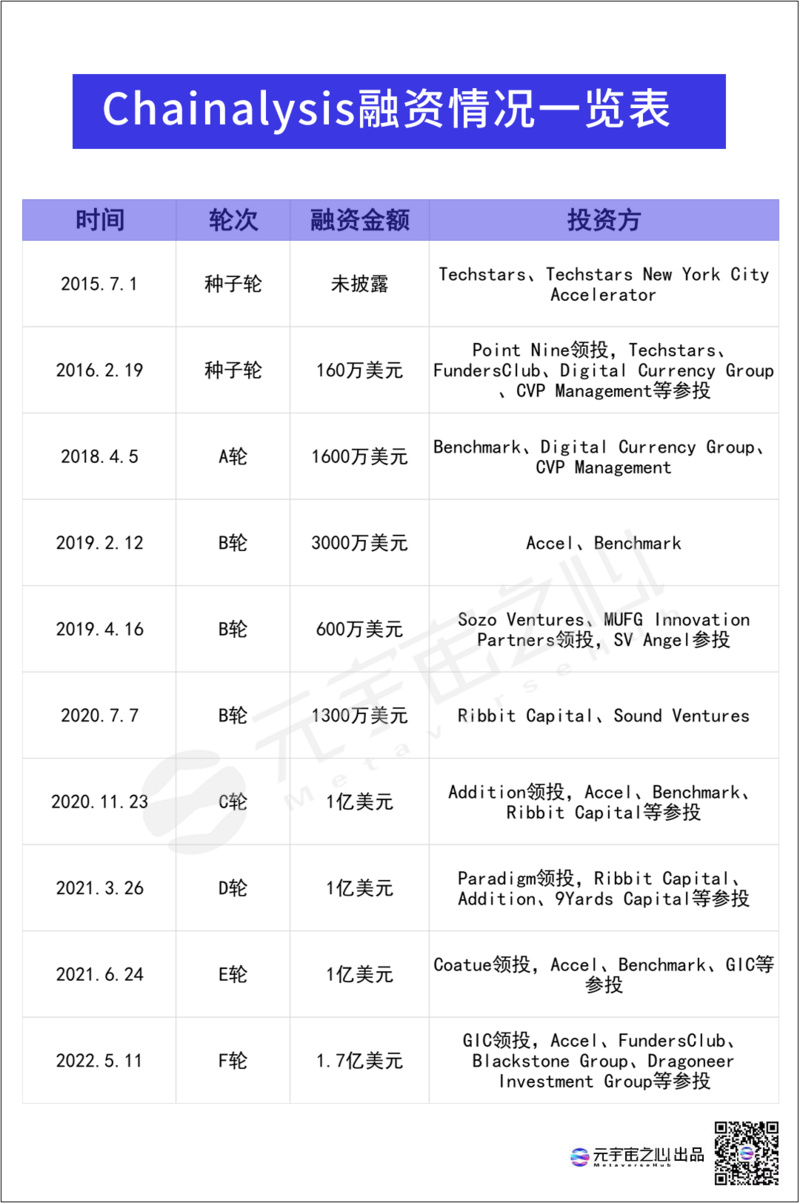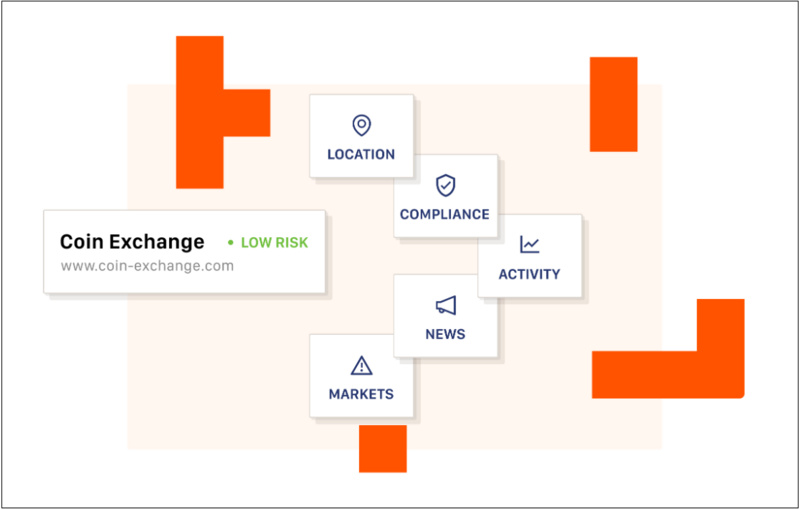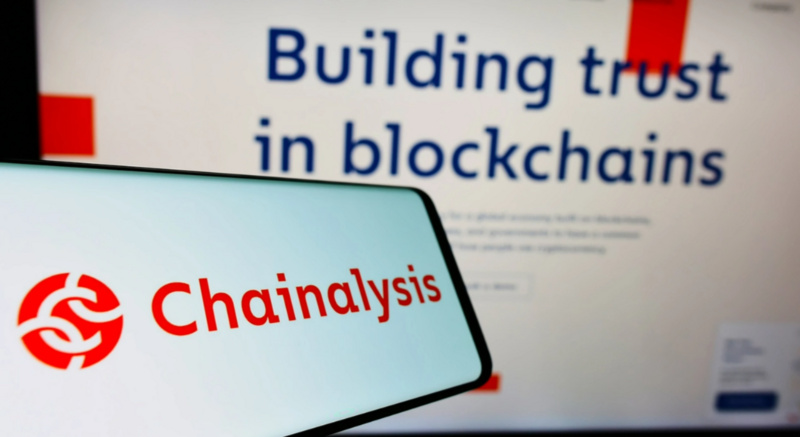Uncovering Chainalysis: How Did It Achieve a Valuation of 8.6 Billion USD?
Source: Heart of the Metaverse MetaverseHub
On May 11, the blockchain data tracking platform Chainalysis secured $170 million in Series F funding led by Singapore's sovereign wealth fund GIC, with its valuation doubling from the previous round to $8.6 billion.
Even as the blockchain industry faces a new wave of winter, Chainalysis's valuation continues to grow.
According to a report released by the U.S. Federal Trade Commission, from the beginning of 2021 to March 2022, losses from scams in the Crypto sector exceeded $1 billion.
Additionally, in the first half of 2022, vulnerabilities related to DeFi resulted in the theft of approximately $1.88 billion worth of digital assets.
With the rapid development of the blockchain industry over the past two years, various security incidents have also surged, threatening not only user asset safety but also impacting the financial system.
Therefore, in the context of a lack of effective regulation in the blockchain industry, the demand for Chainalysis from relevant enterprises and institutions has become increasingly strong.
Chainalysis builds a bridge between the Crypto world and the fiat world, filling the gap in on-chain regulation to help more users confidently enter the Web3 world.
This solution relies on the integration and analysis of Web3 ecosystem data. So, what is Web3 data analysis? What value does Chainalysis provide through Web3 data analysis?
What Does Web3 Data Analysis Do?
Web3 is a decentralized network where individuals can control their own data and assets rather than being controlled by a single entity or organization, and achieving this requires support from blockchain technology.
Blockchain technology is a distributed decentralized database that allows data stored within it to be distributed across different nodes, ensuring data immutability, while the data is also publicly transparent and traceable.
However, under the premise of ensuring openness and fairness, the sources and destinations of this data are anonymized in string form, providing strong privacy protection.
Thus, we can obtain real, privacy-protected transaction data and user operation data on the blockchain.
But this data is chaotically and massively stored in blocks, requiring some Web3 data analysis tools to process the data, allowing for the analysis of on-chain fund situations and user behaviors without compromising others' privacy, enabling decision-makers and key organizations to make better judgments.
The research firm Muddy Waters Research previously employed over 1,500 staff to conduct an in-depth investigation into Luckin Coffee, ultimately releasing a nearly 90-page short-selling report that successfully shorted Luckin Coffee. Although they profited significantly, they also invested considerable effort to collect data.

However, in the Web3 space, similar operational data is real and publicly transparent on the blockchain, allowing everyone to intuitively understand the true situation of various projects, and project companies cannot manipulate the data, which instead forces them to focus more on managing the projects themselves.
Therefore, blockchain is also referred to as the trusted internet. With the arrival of Web3, we will also welcome a more trustworthy world, but this requires data companies that analyze blockchain anonymity, giving rise to another track.
How Did Chainalysis Come Into Being?
In 2014, the Japanese Crypto exchange Mt. Gox declared bankruptcy after being revealed to have been hacked, losing 850,000 bitcoins (approximately $5 billion at the time).
Reports indicated that Mt. Gox accounted for nearly 70% of the global bitcoin trading volume at that time. The industry is indeed full of opportunities, but it often comes with significant risks.
The Mt. Gox incident, as an early iconic risk event in the blockchain industry, not only raised user concerns about asset safety but also sparked a new idea in Michael Gronager: for Crypto to achieve widespread adoption, it needs to be regulated.
In October of the same year, former COO of the Crypto exchange Michael Gronager co-founded the blockchain data tracking platform Chainalysis with his partners, subsequently becoming the official investigator of the Mt. Gox case, assisting the U.S. government in tracking some of the stolen bitcoins.
In its early days, Chainalysis's main business included helping clients comply with regulatory requirements, assessing risks; providing bitcoin transaction analysis software; identifying illegal activities, etc., serving clients including governments, financial institutions, and Crypto exchanges.
It was precisely because of Chainalysis's outstanding performance in the Mt. Gox case that it earned the nickname "on-chain FBI" in the industry.
In 2015, Chainalysis signed its first contract with the FBI for just $9,000. It was also in this year that Chainalysis completed its first round of funding led by Techstars.
To date, Chainalysis has completed 10 rounds of financing since its establishment, raising over $536 million.

It can be seen that Chainalysis's financing has gradually shown exponential growth, and at the same time, its business landscape is further expanding.
Currently, Chainalysis provides data, software, services, and research for government agencies, exchanges, financial institutions, as well as insurance and cybersecurity companies in over 70 countries/regions.
In the field of blockchain data analysis, Chainalysis has made significant progress, and with the launch and application of its core products, this new financial system will undoubtedly receive good regulation.
What Value Does Chainalysis Provide?
Having discussed the birth and development of Chainalysis, what is the magic that allows it to become a unicorn in just a few years? Let's break it down from its core business.
Chainalysis Business Data
Chainalysis Business Data provides additional customer information for blockchain-related businesses, helping users better understand customers, customize products, and explore new revenue sources.
By transforming customer on-chain behavior data into intuitive data charts, Chainalysis Business Data helps provide more accurate information for organizational decision-making, optimizing market development and improving customer experience.
Chainalysis Business Data also assists users in making data-driven decisions, allowing business development, operations, marketing, and product teams to invest in countless ways to attract and retain customers, utilizing trusted datasets to help users understand the situation of customers, products, and markets to better optimize their marketing strategies, driving better business outcomes.
The data provided by Chainalysis Business Data is updated in real-time, allowing users to understand the feedback from adjustments made, thus obtaining more valuable business strategies.
Chainalysis KYT (Know Your Transaction)
Traditional finance has KYC (Know Your Customer) policies, which involve thoroughly understanding your customers and strengthening the review of account holders, forming the institutional foundation for anti-money laundering to prevent corruption and understand the legality of fund sources.
However, in the blockchain field, due to the uniqueness of blockchain, some tools are needed to gain a clearer understanding of the situation of funds.
Based on this demand, Chainalysis KYT was born, providing various functions related to data security and risk:
KYT is supported by the best data in the industry, mapping billions of addresses to real-world entities.
KYT can detect high-risk activities, enabling continuous transaction monitoring of Crypto assets and configuring real-time alerts based on the organization's AML strategy.
KYT comprehensively monitors all addresses controlled by entities to obtain real-time intelligence about their fund sources or destinations, allowing users secure access to Crypto assets (including NFTs).
KYT can build workflows around teams, recording every compliance decision made by the team, exporting a complete audit trail that can be shared with banks and regulatory agencies.
KYT provides users with alerts for unknown risks and employs a hybrid approach that combines traditional rules with behavior-based alerts to improve alert accuracy, helping users optimize the detection of more complex patterns.
Chainalysis Kryptos
Chainalysis Kryptos provides deep on-chain metrics for Crypto businesses based on the most trusted blockchain data in the industry.
Chainalysis offers over 6,500 unique services, monitoring hundreds of millions of blockchain addresses that have transferred over $6 trillion in value.

Kryptos uses the most comprehensive dataset in the industry to understand the on-chain behavior of entities and compile service profiles, utilizing data trusted by regulators and law enforcement to inform due diligence processes.
It provides rapid insight services for high-risk entities to mitigate risks. As a pioneer in this field, Chainalysis's data is trusted globally by law enforcement, regulatory agencies, exchanges, and financial institutions.
Chainalysis Reactor
Chainalysis Reactor is a tool for tracking the flow of funds/user behavior on the blockchain, associating blockchain activities with the real world by tagging addresses.
As mentioned earlier, blockchain-related addresses have significant anonymity, so such tools are needed to facilitate monitoring of blockchain addresses by certain institutions.
Additionally, Reactor also provides identifier-based search services, allowing users to input some blockchain addresses to understand which entity controls the wallet and find associated addresses, meaning that this tool can also track the movement of some funds.
Moreover, Reactor offers some economic behavior dynamics, including custom records, annotations, and building user behavior profiles, enabling investigators to share charts or export raw data records.
It can be said that Reactor is almost a specialized service tool born for Web3 using blockchain as the underlying technology, and it is a necessity for certain institutions and regulatory organizations.
Chainalysis Market Intel
"Market Intel" is a data-driven portal launched by Chainalysis that utilizes various data accumulated by Chainalysis over the past few years to generate real-time data and insights about the use of Crypto, providing information on the operation and growth insights of the Crypto market.
Compared to the previous tool products, this portal can serve as a comprehensive application of Chainalysis in data analysis, presenting it in a popular manner (such as images or charts) for ordinary users to observe industry changes.
It is precisely because Chainalysis provides these effective tools or products that it has attracted the use of 700 enterprises/organizations in 70 countries/regions worldwide. We believe that as the Web3 industry develops, this number will continue to grow.
What Is the Significance of Web3 Data Analysis for Industry Development?
Data, as a precious asset akin to oil in the 21st century, has received unprecedented attention today.
On one hand, the concept of data ownership returning to individuals in Web3 is increasingly welcomed by institutions and individuals.
On the other hand, Web3's native blockchain applications also have some anonymity issues, necessitating institutions like Chainalysis to assist real-world regulatory agencies in conducting reviews.
Therefore, the logic is that we need more secure and reliable Web3 applications to align with our aspirations for data protection.
On the other hand, we cannot have completely "black box" data; after all, what is stored in this "black box," and whether it threatens the information security of more people has become a concern for many decision-makers.

The background of Chainalysis's birth is the recognition of unique problems in the blockchain industry, but this issue was primarily about monitoring the flow of Crypto.
It has now become an urgently needed third-party platform for the entire blockchain or Web3 industry, which is why Chainalysis's valuation can be so high and why it has garnered favor from many institutions.
Of course, the Web3 endeavor may just be beginning. We are also seeing more companies and entrepreneurs joining the Web3 track, but the stories derived from the development of the internet tell us that every industry has specific data analysis companies, just as the domestic internet has seen the emergence of FanRuan over the past decade (the number one company in the Chinese BI market certified by IDC).
Perhaps in the current development of Web3, Chainalysis can become the "FanRuan" of on-chain data analysis, which is an institution needed in the ecosystem.
At the same time, for Web3, having one or more good data analysis companies can both regulate industry development and empower the industry forward, creating a win-win opportunity.
We also see many companies alongside Chainalysis, such as Elliptic, TRM Labs, Footprint, and other leading data analysis companies that have also gained capital favor. Perhaps the story in this niche track of Web3 is far from over, and there is still an opportunity for the next tech unicorn to emerge. We are excited to see who will become the next Chainalysis.










